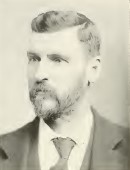 AMBROSE D. COUNTRYMAN The
paternal ancestors of Ambrose D. Countryman were
Germans, and settled in the Mohawk Valley, New
York, early in the eighteenth century. His great
grandfather was a faithful soldier in the army of
the revolution, and his father, P. F. Countryman,
was still living in the empire state when the
subject of this sketch was born, February 8, 1850.
On his mother’s side, Mr. Countryman comes
of good old English stock, and the branch of the
family to which she belongs were early settlers in
Vermont. Her maiden name was Elizabeth E. Gleason.
AMBROSE D. COUNTRYMAN The
paternal ancestors of Ambrose D. Countryman were
Germans, and settled in the Mohawk Valley, New
York, early in the eighteenth century. His great
grandfather was a faithful soldier in the army of
the revolution, and his father, P. F. Countryman,
was still living in the empire state when the
subject of this sketch was born, February 8, 1850.
On his mother’s side, Mr. Countryman comes
of good old English stock, and the branch of the
family to which she belongs were early settlers in
Vermont. Her maiden name was Elizabeth E. Gleason.
When he was five years of age, young
Countryman left St. Lawrence
County, New York, his birth-place, and came with
the other members of his father’s family to
Nininger, Dakota County, Minnesota, then a wild
country on the frontier of civilization, and here
it was that he passed his boyhood and youth,
attending the country schools in the winter and
working on his father’s farm in the summer. The family
was poor and Ambrose was the eldest of eleven
children. In 1861 his father enlisted as a member
of the second Minnesota volunteer infantry,
serving until the close of the war, in 1865. During all
these years, the oldest son, who in 1861, was a
lad of eleven, was burdened with a responsibility
far beyond his years and compelled to undertake
the work of a man on the farm. But this turned out
to be good training. The war over, the husband and
father resumed his place as the head of the family
and the eldest son was permitted to finish his
education.
He went for one year to Hamline University,
then located at Red Wing; one year to the state
university and two years to Washington University,
St. Louis, graduating from the St. Louis law
school (Washington University) in June, 1874, with
the degree of LL. B. Mr. Countryman earned his
first dollar grinding grain after a McCormick
reaper, and taught school in order to earn money
to carry him through college. In June, 1876, he
settled in Appleton, Swift County, Minnesota, on a
homestead, and in March, 1879, began to practice
law in that place, which has ever since been his
home.
In addition to the practice of his
profession, he has for a number of years been
engaged in the newspaper business, first with the
“Appleton Press,” and later with the “Appleton
Tribune.” He always has been a Republican, and his
party locally has honored him repeatedly. From
1878 to 1882 he was county commissioner of Swift
County, and from 1882 to 1889 judge of probate of
Swift County. For fifteen years he has been a
member of the board of education of Appleton, and
is now president of the board. Since 1884 he has
been village justice of Appleton. For years prior
to 1897 he was secretary of the Republican club
organization in his home town. In 1897 the state
senate elected him first assistant secretary, a
position whose duties he discharged with marked
ability.
Mr. Countryman is past master of Appleton
Lodge, No. 137, A. F. and A. M., and past
chancellor commander of Appleton Lodge, No. 76,
Knights of Pythias. Of both lodges he is a charter
member. As a member of the Masonic Grand Lodge of
Minnesota he is chairman of the committee on
returns of lodges. He is a
member of the Episcopal church, and senior warden
of Gethsemane parish, Appleton. August 30,
1874, he was married to Miss Jane Beswick, and
three children have been born to them. Helen L.,
December 23, 1876, Ernest A., March 23, 1882, and
Peter F., September 21, 1885. Mrs.
Countryman was born in
England.